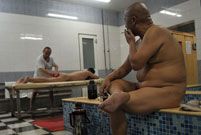 Opps! What a coincidence!
Opps! What a coincidence!
 Breathtaking scenery in Redstone Park in SW China
Breathtaking scenery in Redstone Park in SW China
 Vintage cars show kicks off in London
Vintage cars show kicks off in London
 Gorgeous scenery in NE China
Gorgeous scenery in NE China
 Picturesque Barkol grassland in Xinjiang
Picturesque Barkol grassland in Xinjiang
 Small Wild Goose Pagoda - A World Cultural Heritage Site along the Silk Road
Small Wild Goose Pagoda - A World Cultural Heritage Site along the Silk Road
 Maritime Silk Road Luxuries of the Han Dynasty
Maritime Silk Road Luxuries of the Han Dynasty
 Ciao! Chinese beauties!
Ciao! Chinese beauties!
 An eye feast: BFA freshmen registration
An eye feast: BFA freshmen registration
 Top 10 most lavish weddings
Top 10 most lavish weddings
WASHINGTON, Oct. 2 -- Chinese Foreign Minister Wang Yi on Wednesday expressed the hope that China and the United States would enhance mutual trust, expand cooperation and avoid misjudgment.
Wang met with U.S. President Barack Obama, Defense Secretary Chuck Hagel and Secretary of State John Kerry on Wednesday.
At a meeting with Wang, Obama said he was looking forward to visiting China in November and his meeting with Chinese President Xi Jinping.
ENHANCEMENT OF MUTUAL TRUST
Wang said China welcomes Obama's visit and is ready to work with the United States to deepen strategic mutual trust, expand mutually beneficial cooperation, and get real results from efforts to develop a new type of major-country relationship between the two countries.
When meeting with former U.S. National Security Advisor Thomas Donilon on Tuesday, Wang said that, for the sake of genuinely implementing the consensus on building a new type of major-country relationship, China and the United States first need to create mutual trust, dispel mutual suspicion and prevent strategic miscalculation.
The Chinese top diplomat also expressed this viewpoint during his meeting with Hagel, saying that China and the United States should build strategic mutual trust, including mutual trust between their military forces, and reduce mistrust.
EXPANSION OF COOPERATION
Meeting with Kerry, Wang said that the common interests between China and the United States far outweigh their differences and that there are more fields where the two countries could and should cooperate with each other.
"This meets our common interests and the interests of the international community. It is also in line with the trend of human progress," the Chinese minister said.
He suggested the two countries accelerate the negotiation on a bilateral investment treaty and make more arrangements for visa reciprocity so as to facilitate two-way investment and personnel exchanges.
In addition, Wang noted that China is forging ahead an anti-corruption campaign and stands ready to enhance cooperation with the U.S. side in criminal manhunt and illicit-money recovery.
China and the United States, said Wang, should also enhance communication and cooperation on anti-terrorism, the fight against climate change and the Ebola virus.
Kerry urged the two countries to enhance cooperation in various fields and jointly face up to challenges brought by a range of international and regional issues such as climate change, terrorism, the nuclear issue of the Democratic People's Republic of Korea and the nuclear issue of Iran, among others.
MANAGEMENT OF DIFFERENCES
China agrees with the U.S. proposal that China and the United States should work together to maximize cooperation and minimize differences, Wang said at the White House when meeting with Obama.
At the Pentagon, Wang told Hagel that China respects the U.S. traditional influence and realistic interests in the Asia-Pacific region and supports its constructive role in Asia-Pacific affairs, while the United States should respect China's status and influence in the region, its need for reasonable development space and its legitimate rights.
China hopes the United States will properly handle those issues that hinder the development of China-U.S. ties, such as its sales of weapons to China's Taiwan, and its warships and military aircraft's approaches to China for surveillance, he said.
Hagel said that the United States and China are partners, not rivals, and there are far more common interests than differences between the two countries.
During his meetings with U.S. leaders at the White House and the State Department, Wang also expounded on the Chinese government's principled position on Hong Kong's current situation, saying Hong Kong affairs are China's internal affairs and all countries should respect China's sovereignty.
 Vibrant 21-year-old and her own Cheongsam brand
Vibrant 21-year-old and her own Cheongsam brand Fashion style: Faye Wong vs Cecilia Cheung
Fashion style: Faye Wong vs Cecilia Cheung Jungle law: leopard preys on impala
Jungle law: leopard preys on impala Female bus driver drives Land Rover for commuting
Female bus driver drives Land Rover for commuting Century-old public bath closes door in Beijing
Century-old public bath closes door in Beijing Leading director Wang Quan'an detained for 'buying sex'
Leading director Wang Quan'an detained for 'buying sex' Mixed reaction to smartphone sidewalk
Mixed reaction to smartphone sidewalk Amazing aerial photos of China's Xisha Islands
Amazing aerial photos of China's Xisha Islands Top 10 world's highest-paid models 2014
Top 10 world's highest-paid models 2014 Lingerie show at 2014 Miss China
Lingerie show at 2014 Miss China Songstress Li Xianglan dies at 94
Songstress Li Xianglan dies at 94 Police recruiting posters
Police recruiting posters Anshun Daxi- Living fossil of Chinese drama
Anshun Daxi- Living fossil of Chinese drama Urban farmers in China
Urban farmers in China 'Firepower-2014 Weibei'military exercise
'Firepower-2014 Weibei'military exerciseDay|Week|Month